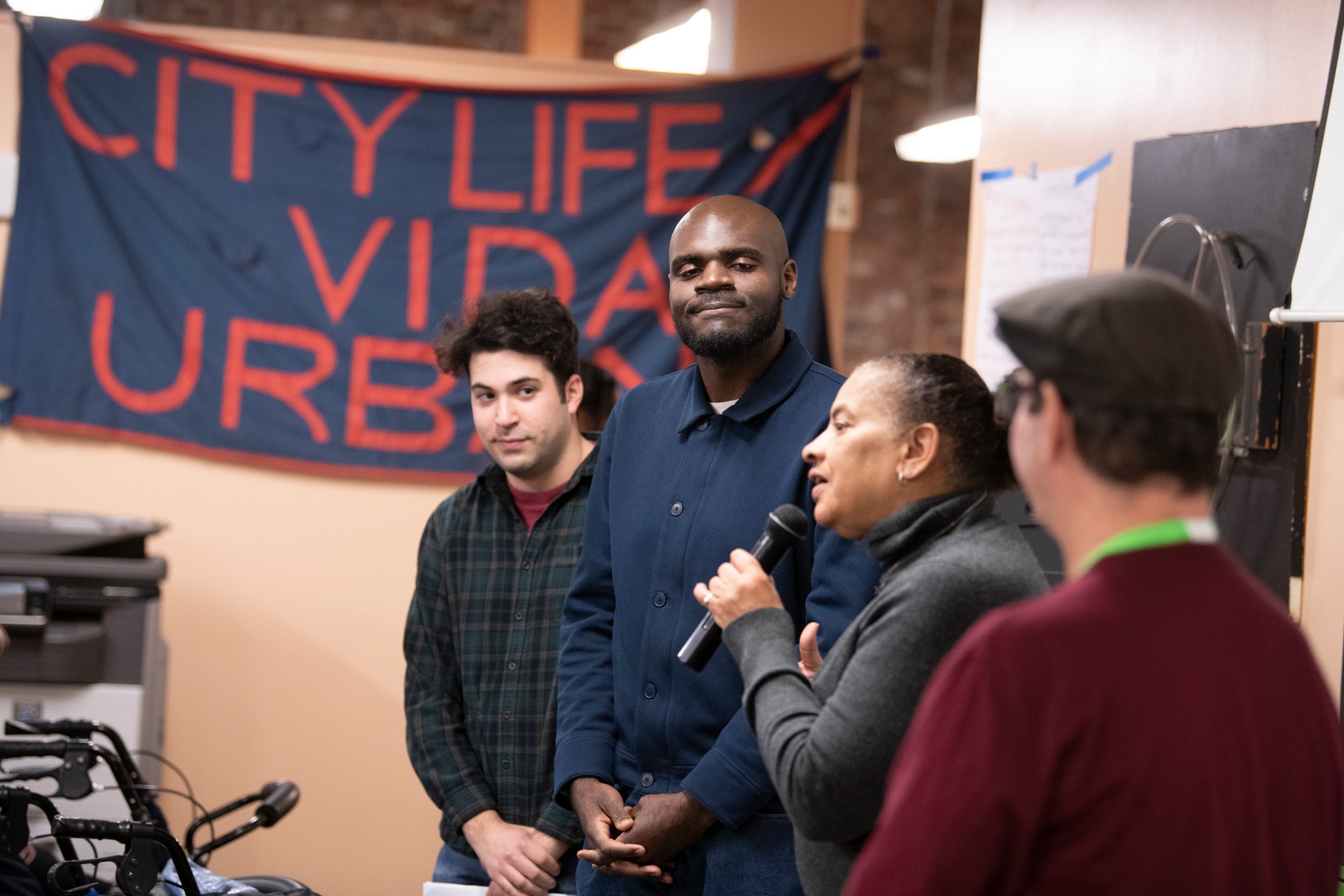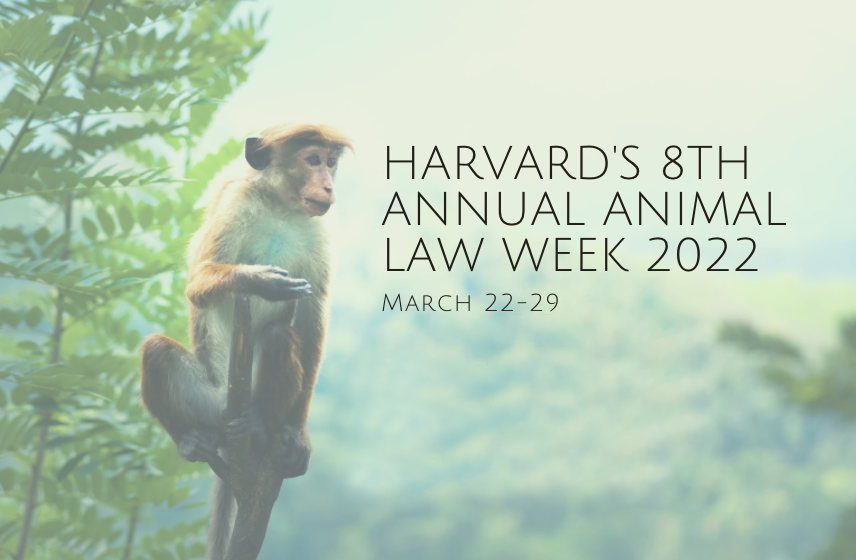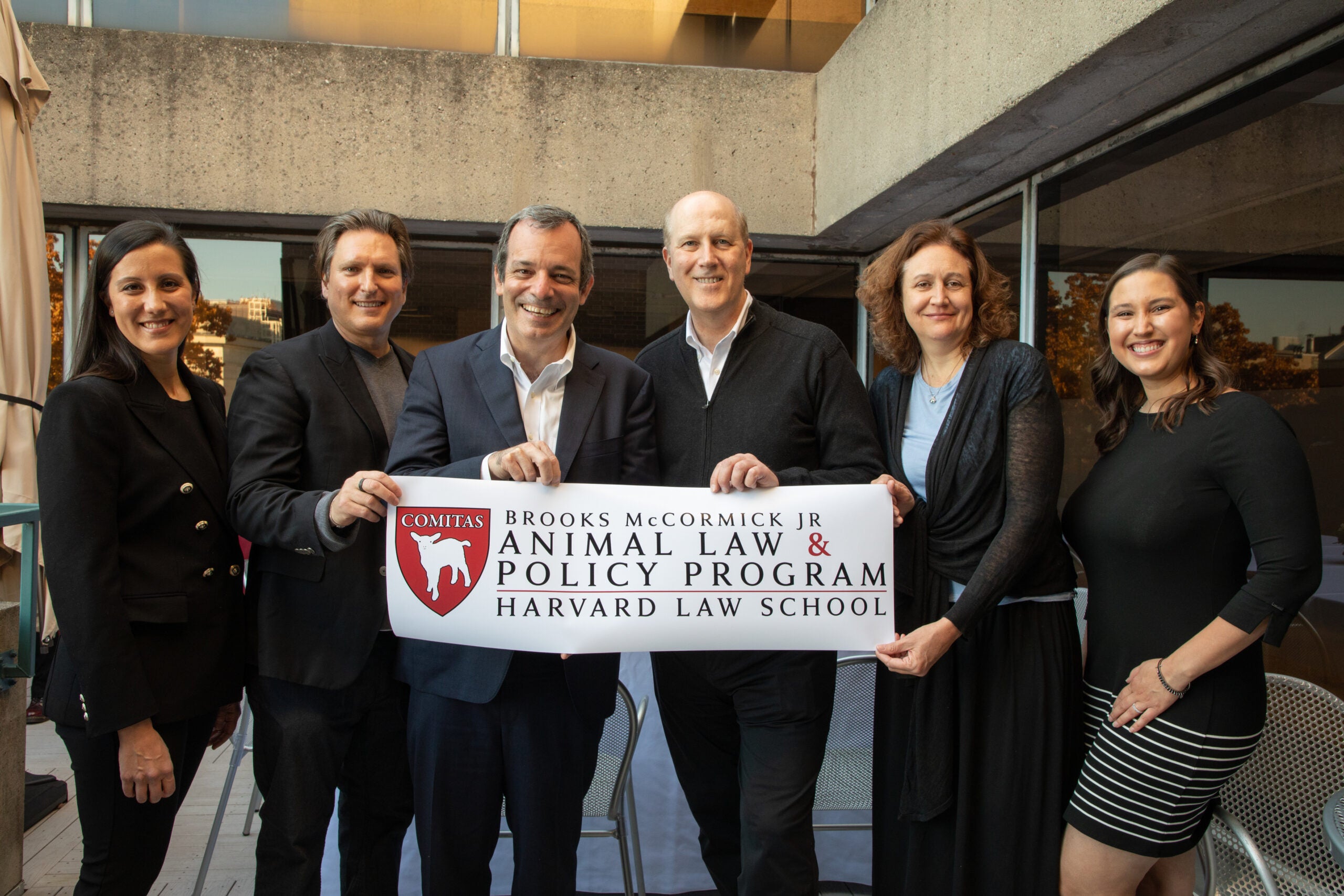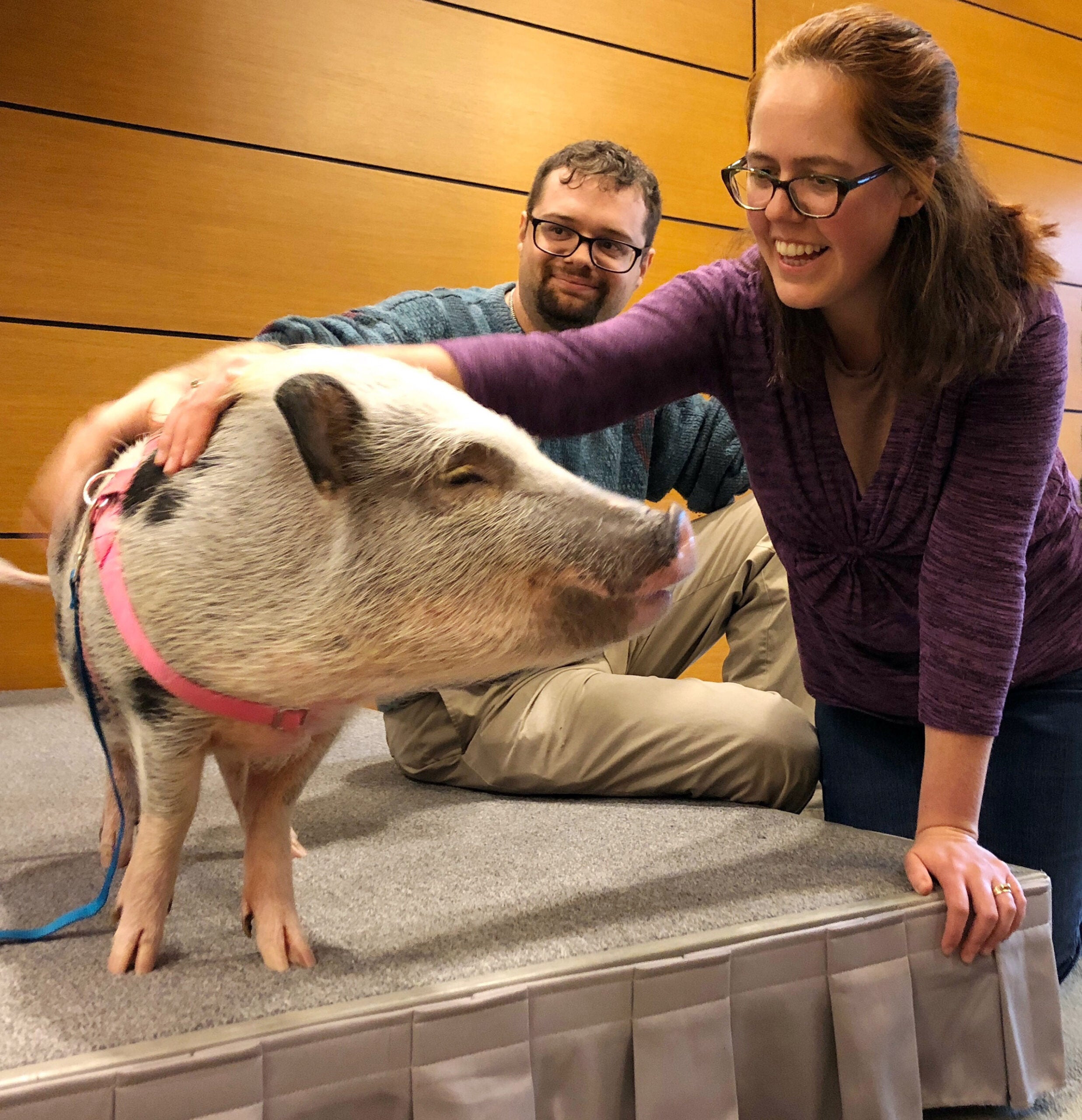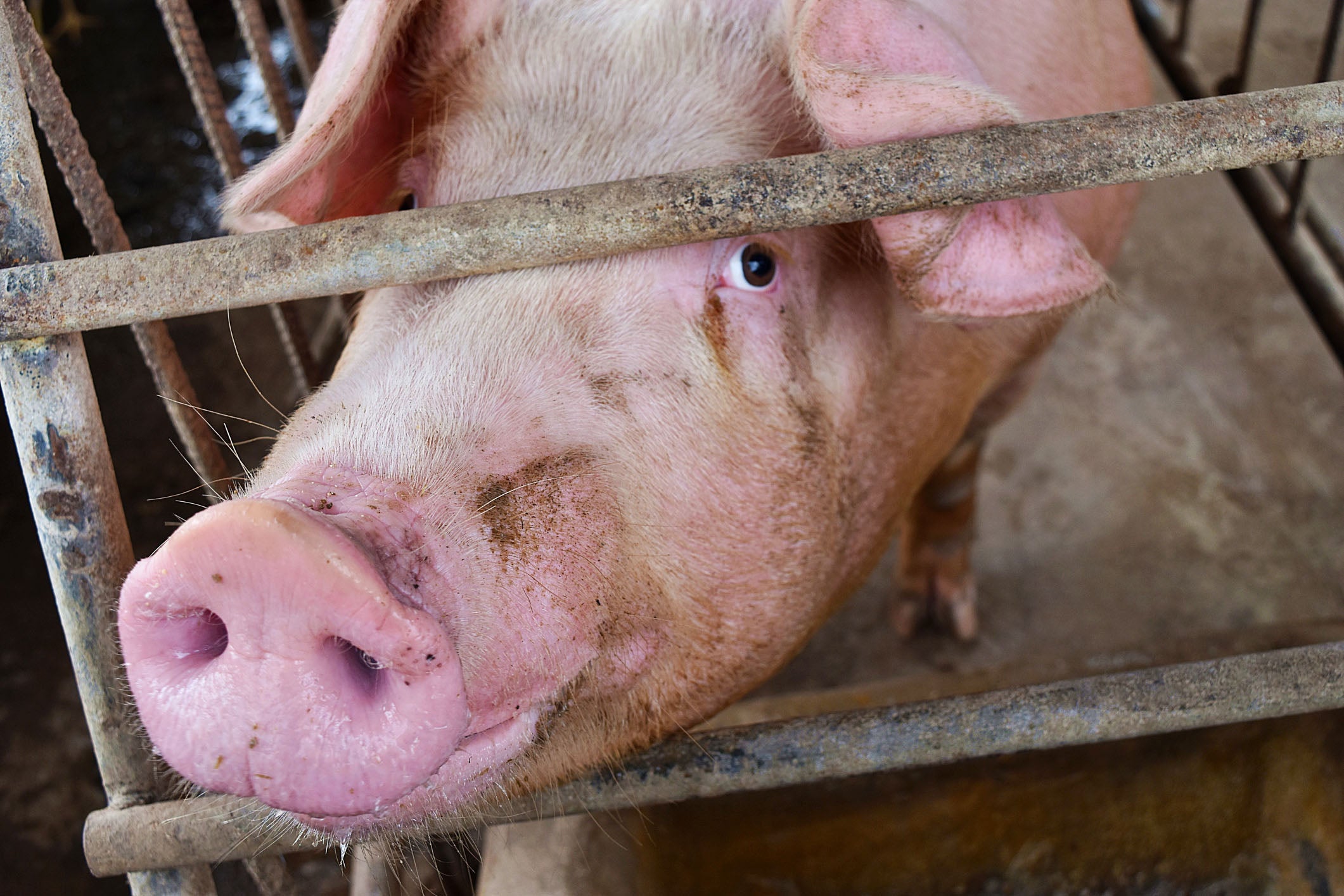People
Chris Green
-
‘Unintended consequences’ Harvard Law School says EATS Act could backfire on Iowa farmers
July 27, 2023
“Very real unintended consequences.” That’s what Harvard University Law School says about a bill proposed by Congresswoman Ashley Hinson. The school is sounding the alarm…
-
Last fall, an undercover investigator worked for two months at a Virginia farm outside Richmond that raises chickens on contract for Tyson Foods, America’s largest…
-
All Creatures Great and Small
February 14, 2023
The HLS animal law program is trying to prove that better animal welfare is good for everyone
-
Motorists passing through parts of southeastern North Carolina can smell the presence of industrial hog farms. But few get to see – or would want…
-
Op-Ed: The Supreme Court shouldn’t meddle with California’s standards on meat and eggs
October 11, 2022
An op-ed co-written by Laurence Tribe and Chris Green: On industrial pig farms in the United States, mother pigs are confined for their entire lives…
-
The Supreme Court is about to decide the fate of millions of pigs
October 11, 2022
The Supreme Court regularly makes decisions that directly affect the lives of tens of millions of Americans. But next week, the Court will hear oral…
-
Clinics in Action
July 15, 2022
For one day in the 2019–2020 academic year, Harvard Law Today followed just a handful of Harvard Law's 47 legal clinics to see their work — and their efforts to advance justice — in action.
-
Chris Green, executive director of the Brooks McCormick Jr. Animal Law & Policy Program at Harvard Law School, will receive the American Bar Association’s Tort Trial and Insurance Practice Section (TIPS) Animal Law Committee’s Excellence in the Advancement of Animal Law Award at a reception on April 28 during the TIPS Section Conference, April 27-30. The award recognizes exceptional work by an Animal Law Committee member who, through commitment and leadership, has advanced the humane treatment of animals through the law.
-
A new partnership between George Washington University Law School and the Animal Legal Defense Fund aims to transform animal law from a niche specialty into a widely taught discipline by developing a cadre of faculty trained in the subject. The Fund has already raised money to hire an executive director for George Washington’s new Animal Legal Education Initiative and hopes to have the program up and running in the fall. ... “Anything any law school can do to foster interest in animal law and help further the field and scholarship is only a good thing,” said Chris Green, executive director of Harvard Law’s Brooks McCormick Jr. Animal Law & Policy Program.
-
2022 Harvard Law School Animal Law Week
March 22, 2022
Animal law advocates gather to at Harvard Law School for the eighth annual Animal Law Week.
-
Column: Pork producers are in full squeal over California’s farm animal rules. You should tune them out
February 23, 2022
Major pork producers — a big part of Big Meat, as the livestock industry is often known — have been pulling out the stops recently to eviscerate a California law regulating how they treat pregnant sows. They've asked the Supreme Court to overturn the state's regulations. (The justices may issue a decision on whether they'll take the case as soon as Monday.) ... These practices may have been tacitly accepted by the public because pigs weren't seen as they are — as intelligent animals that prefer room to roam. "The sows can't move, they're biting at the bars," says Chris Green, executive director of the Animal Law and Policy Program at Harvard Law School. "There are massive, massive psychological welfare issues."
-
$10 million endowment established for the Harvard Law School Animal Law & Policy Program
November 10, 2021
Harvard Law School today announced the establishment of a $10 million endowment for the Animal Law & Policy Program, thanks to a gift from the Brooks Institute for Animal Rights Law and Policy.
-
Dog experiments at VA necessary for ‘only a few areas of research,’ panel says in sweeping report
July 6, 2020
A national advisory panel Wednesday concluded that most recent research involving dogs conducted by the Department of Veterans Affairs was unnecessary and that the agency should do more to justify limited use of canines and improve the lives of those still used. The sweeping report underscored long-standing concerns from lawmakers about the canine experimentation. The report, written by an expert panel convened by the National Academies of Sciences, Engineering and Medicine — an independent agency that advises the government — found that dogs remain important models for four areas of cardiovascular and spinal cord research relevant to veterans’ health. But it strongly urged VA to work far harder at identifying alternatives to laboratory dogs, including trials involving pet dogs and methods and technologies that do not involve animals...But in its final recommendation, the panelists said VA could do much more to improve the dogs’ welfare, including by voluntarily submitting animal welfare inspections to the USDA... “This is one we felt really strongly about,” said committee member Chris Green, executive director of Harvard University’s Animal Law and Policy Program. “If it is absolutely vital that dogs are the only option to conduct an experiment that VA determines to be a valid, necessary biomedical experiment, then you make sure the dogs are treated as well as you possibly can.”
-
Resolution on animal training for police passes; some say such measures aren’t ABA’s ‘core mission’
February 18, 2020
The importance of providing police officers with comprehensive animal encounter training was addressed in a measure approved by the ABA House of Delegates at the 2020 ABA Midyear Meeting in Austin, Texas, on Monday. Resolution 103A encourages the use of laws and policies that provide training on the amount of force that is reasonably necessary during encounters with family pets and other animals to protect both officers and the public, reduce potential legal liability, and ensure the animals are treated humanely...Chris Green, the executive director of the Animal Law and Policy Program at Harvard Law School and the former chair of the Tort Trial and Insurance Practice Section’s Animal Law Committee, spoke in favor of the resolution. He said shootings of animals increase the risk of police officers accidentally shooting innocent bystanders, including children, as well as the legal liability for governments that may need to settle with victims’ families. “When things go wrong, the physical, emotional, legal and financial consequences can be catastrophic,” he said. Green added that when states like Texas and cities like Chicago promoted nonlethal animal encounter training programs, they significantly reduced unnecessary accidents involving police officers and animals.
-
Kansas’s ag-gag law has been ruled unconstitutional
January 24, 2020
Kansas cannot bar people from conducting undercover investigations on factory farms, the a federal court in Kansas ruled Wednesday. For nearly 30 years — since 1990 — a Kansas state law made it illegal to take photographs or record video in a factory farm or slaughterhouse “with the intent to damage an enterprise conducted at the animal facility.” ... Animal advocates have responded with caution. “None of the major animal protection groups have done anything in Iowa in the last seven years,” Harvard’s Chris Green told me last year. The ag-gag laws worked. And when Iowa’s law was overturned, animal activists went back to work in the state. (Iowa has since tried another ban, but that one has been held up in court as well.)
-
Animal Law and Policy Clinic launches at Harvard Law School
August 5, 2019
Harvard Law School has announced the launch of the new Animal Law and Policy Clinic, to be led by Visiting Assistant Clinical Professor Katherine Meyer and Clinical Instructor Nicole Negowetti.
-
Fifth annual Animal Law Week held at HLS
April 3, 2019
Animal law advocates from a variety of disciplines and perspectives come together at Harvard Law School for the fifth annual Animal Law Week.
-
“Ag-gag laws” hide the cruelty of factory farms from the public. Courts are striking them down.
January 14, 2019
... In 2012, the Iowa legislature passed a law banning the collection of evidence of crimes like those. And Iowa isn’t alone. Several states have passed — and many others have considered — so-called “ag gag” laws, which criminalize the undercover investigations that reveal abuses on farms. Legislators have been forthright about their motives too. They’re worried that evidence of what goes on on these farms will outrage Americans — so they want to ban it. ... That means that in practice, no misconduct can ever be proven on only the first day of investigating. “Say you have a DEA agent who spends months undercover to infiltrate a drug cartel,” Chris Green, the executive director of Harvard Law School’s Animal Law & Policy Program, told me. “This is like requiring them to reveal themselves the first time they see a $5 drug buy.” You’ll never get to the heart of the abuses that way — which, of course, may be exactly what the industry, which backs quick-reporting, wants.


